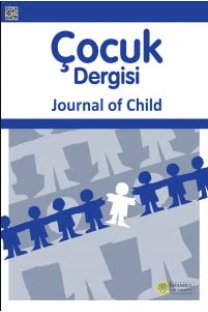Çocuk gelişiminde müziğin yeri
Müzik, Beyin, Çocuk gelişimi
Music and child development
Music, Brain, Child Development,
___
- 1.Faienza C, Cossu G. Introductory remarks on musical beginning: ten years later. Ann NY Acad Sci 2003; 999: 392-6.
- 2.Kenelly J. The specialist role of the music therapist in developmental programs for hospitalized children. J Pediatr Health Care 2000; 14: 56-9.
- 3.Nehir C. Müziğin insan sağlığına etkileri. Çağdaş Akpınar Dergisi, Temmuz 1999, s. 33-4.
- 4.Büyük Larousse. 6. Cilt, Interpress Basın ve Yayıncılık A.Ş. İstanbul, 1995, s. 2762-6.
- 5.Saffran JR. Musical learning and language development. Ann NY Acad Sci 2003; 999: 397-401.
- 6.Moore DG, Burland K, Davidson JW. The social context of musical success: a developmental account. Br J Psychol 2003; 94: 529-49.
- 7.Wells KM. Music education and child development. http://akak.essortment.com/musiceducation
- 8.Piano and Computer Training Boost Student Math Achievement - UC Irvine. Music Intelligence Neural Development Institute (MIND Institute) http://www.educationthroughmusic.com7bra-inarticles.htm
- 9.Ciares J, Borgese P. The benefits of music on child development.http://www.paulborgese.com
- 10.Rich Sheridan S. A theory of marks and mind: the effect of notational systems on hominid brain evolution and child development with en emphasis on exchanges between mothers and children. Medical Hypotheses 2005; 64: 417-27.
- 11.Dalla Bella S, Peretz I, Rousseau L, Gosselin N. A developmental study of the affective value of tempo and mode in music. Cognition 2001; 80: B1-10.
- 12.Duyar MS. Mega Hafıza. 1. Cilt. Yıldızlar Ofset, Ankara, 2002, s. 1-3; 6-9.
- 13.Thompson BM, Andrews SR. An historical commentary on the physiological effects of music: Tomatis, Mozart and neuropsychology. Integr Physiol Behav Sci 2000; 35: 174- 88.
- 14.The Mozart Effect. Online Resources on Music/ Brain Research. http://parenting-baby.com
- 15.The "Mozart Effect" How classical music improves intelligence and learning, http://www.childdevelopmentinfo.com
- 16.Say A. Müzik Ansiklopedisi. 1-4. Ciltler. Sanem Matbaası. Ankara, 1985.
- 17.Schellenberg EG. Music lessons enhance IQ. Psychological Science 2004; 15: 511-4.
- 18.Ho YC, Cheung MC, Chan AS. Music training improves verbal but not visual memory: cross-sectional and longitudinal explorations in children. Neuropsychology 2003; 17: 439-50.
- 19.Nehir C. Müzik. Çocuk gelişiminde yer alan faktörler. II. Ulusal Ana Çocuk Sağlığı Kongresi. 4-6 Haziran 2003. Program ve Özet Kitabı. Aka Ofset A.Ş. istanbul, 2003, s. 72.
- 20.Say G. Fazıl Say'ın Annesi Olmak. Yeteneğin Keşfi. İstanbul: Ana Yayıncılık, 2003.
- 21.Sandalcı Turgay Y, Ersan M. Müzik Yolcuları. İstanbul: Bo-rusan Kültür ve Sanat Yayınları, 1999.
- 22.BBC- Parents2 Music Room - Child Development Chart. Motivate your child with music, http://www.bbc.co.uk/music
- ISSN: 1302-9940
- Yayın Aralığı: Yılda 4 Sayı
- Başlangıç: 2000
- Yayıncı: İstanbul Üniversitesi
C-reaktif proteine göre hastalıklar
Saadet AKARSU, Mustafa AYDIN, Erdal YILMAZ, Abdullah KURT, HATİCE GAMZE POYRAZOĞLU, Çıtak A. Neşe KURT
İlköğretim okulu öğrencilerinde anlatsal eğitiminin ağız-diş sağlığı bilgi düzeyine etkisi
Necmi NAMAL, Ertem Hayriye VEHİD, Günay CAN, Suphi VEHİD, Ayşe KAYPMAZ
Cihat ŞANLI, Ülker KOÇAK, MERYEM ALBAYRAK, Ayla OKTAY, Didem ALİEFENDİOĞLU, Selda HIZEL
Çocuk gelişiminde müziğin yeri
Coşkun NEHİR, Gülbin GÖKÇAY, Uğur Serpil BAYSAL
İnfantil kolik ve tedavi modelleri
Yenidoğan kliniğine sevk ve transport edilen hastaların irdelenmesi
Füsun OKAN, Sinan USLU, Asiye NUHOĞLU
Çocuklarda üreteral obstrüksiyonun ender bir nedeni: Retrokaval üreter
İ. Onur ÖZEN, M. Meral GÜÇLÜ, Arzu DEMİRTOLA, Barış BAĞBANCI, RAMAZAN KARABULUT, Billur DEMİROĞULLARI, Nuri KALE
Çocuklarda özofagus yabancı cisimlerine yaklaşım
Mustafa İNAN, Çağatay Yalçın AYDINER, Burhan AKSU, Mehmet PUL
Bakteriyel menenjitli çocuklarda beyin omurilik sıvısında ferritin düzeyi
Sedat ÖKTEM, Tavukçu Fatma ERGİN, Gülnur TOKUÇ
Rabdomiyoliz ile gelen bir santral kor hastalığı vakası
Müferet ERGÜVEN, SARE GÜLFEM ÖZLÜ, Banu BAL, Büge ÖZ, Cüneyt ŞAR
